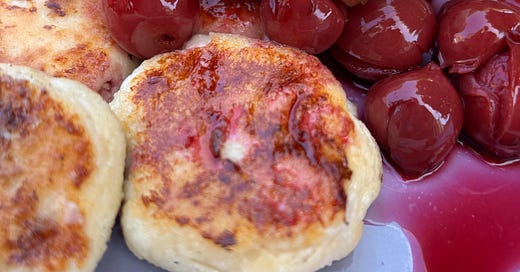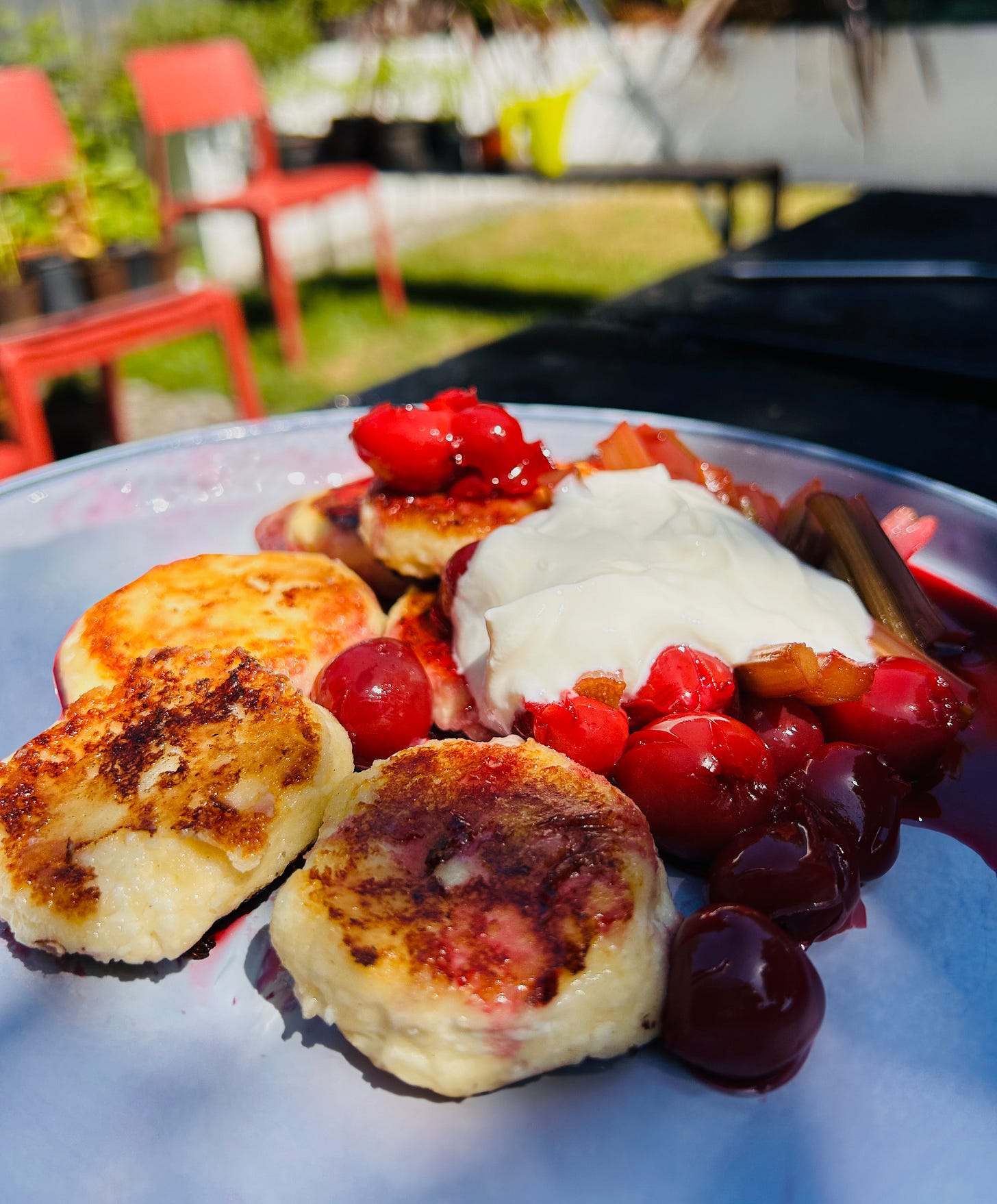Bread & War, and Syrniki
A recipe for tender cheese pancakes served with rhubarb + sour cherries, and a look at Felicity Spector’s inspiring new book, Bread and War, a Ukrainian story of food, resilience and never giving up.
Hello lovely readers, This week’s very special newsletter, including the recipe, is free to all. But I have an offer to make. For every annual subscription to Pen and Spoon taken out before June 1, I will donate half the money to the British registered charity, the Legacy of War Foundation, which does incredible work in Ukraine and other conflict zones, supporting grassroots organisations. So, if you subscribe, you not only gain access to my weekly newsletter and recipes plus my full archive for a year, but £35 of your subscription will go to charity. And if you’re already a paid subscriber, you could gift a subscription?
Just click below.
Even Nigel Slater was there, which says something, as I’m not sure he ventures out to too many book launches. But Felicity Spector managed to lure him, along with an extra-large crowd on Monday night: food writers, publishing people, PRs, television folk and her Ukrainian friends, to support her brilliant new book, Bread & War.
Felicity has spent the past couple of years travelling back and forth to Ukraine, helping Bake for Ukraine, a small non-profit, set up a mobile bakery. Its aim was to help solve the problem of food insecurity in front-line regions, where infrastructure had been destroyed and communities left with little access to fresh bread. Her idea for the book is brilliant: to tell the story of the war, and the impact it has had on Ukrainians, through the lens of bread and baking. Although the backdrop of the book is a catastrophic conflict, Felicity has managed to make her book an uplifting story of joy, hope and resilience.
The venue for the launch was fitting. Tatar Bunar, a newly opened restaurant in London’s Hoxton, is a little corner of Ukraine. It’s wood-fronted with glass-panelled doors, and wall shelves are lined with bright Ukrainian ceramics. A bar runs down the length of the middle dining area, and on the night it was covered with plates of food so exquisite to look at that, at first, no one wanted to be the first to dive in. Once a few plucky and hungry people stepped forward, a queue formed and the spread was demolished. It was the best I’ve ever eaten at a book launch – not a high bar, admittedly – but by any standard it was gorgeous.
The restaurant is named after a town in southern Ukraine and draws on the food traditions of that region, as well as having a Tatar influence. The menu is rooted in restaurateur Alex Cooper's family recipes and cooked by chef Kate Tkachuk. There were sprats with pickled red onions and buttery boiled potatoes. Thick slices of onion bread served with silken wisps of lardo. Shallow bowls of pickled tomatoes piled on whipped labneh were sharp, spiced and slightly fermented, and so delicious they stopped conversation. There were also warm syrniki, small curd cheese pancakes (more about which below) served with jam. And glasses of uzvar, a dark, smoky and faintly sweet drink made from prunes.
There was something just so right about a room full of people coming together over food for this cause. Bread & War tells the stories of Ukrainians who have kept baking throughout Russian bombardment – in basements, parks, restaurant kitchens – not just to feed people, but to keep life going. As Olia Hercules wrote on the cover, the book is about “the power of bread and connection.”
Since then, I’ve been making syrniki, using the recipe at the back of Felicity’s book, which she’s given me permission to share below. They’re not pancakes in the sense we might think of in the UK. Rather, they’re pudgy discs made almost entirely of curd cheese, with egg and just a little flour to bind everything together. There’s a whisper of sugar but, traditionally, I think the jam or fruit you serve with them delivers sweetness. I adore them warm, straight from the pan: tender and melting on the inside, crisp and golden on the outside.
I hope with all my heart that one day in the very near future, I get to enjoy them in Ukraine.
Syrniki with rhubarb and sour cherries
This is Felicity’s recipe for syrniki, which appears in a small recipe section at the back of Bread & War. The serving suggestion is mine: rhubarb from my garden and sour cherries from the Polish shop where I bought the tvorog (curd cheese) seemed fitting. A spoonful of sour cream to finish, and this is a wonderful dish for breakfast or as a pudding.
For the syrniki
220g curd cheese (best to use full-fat Polish tvorog, available in Eastern European shops and big supermarkets)
40g cream cheese
1 egg yolk
½ tsp vanilla extract or paste
1 tbsp caster sugar
2 tbsp plain flour, plus extra to dredge
75g raisins (optional)
30ml sunflower oil
Sour cream, to serve
For the rhubarb and sour cherries
Roast rhubarb (there’s a recipe for roasting rhubarb here
A jar of sour cherries in juice or sour cherry jam
Method
Put the cheeses, egg yolk, vanilla, sugar and two tablespoons of flour into a large bowl and blend together with a stick blender (or you can just use a fork) until relatively smooth. Stir through the raisins, if using.
Cover and leave in the fridge for at least 30 minutes, or overnight. This will help the flour absorb some moisture from the cheese and make them easier to shape.
Divide into small balls – about 20 to 25 grams each – and flatten with the palm of your hand. Dredge in flour on both sides.
Fry the syrniki in sunflower oil on a medium-low heat for about 3 minutes each side, until a gentle golden brown and cooked through in the middle.
Serve the syrniki warm, straight from the pan. I served them with roast rhubarb, sour cherries from a jar and some of the jar juice, which I simmered to reduce to a syrup. Alternatively, use sour cherry jam. Top with a spoonful of sour cream.







Thank you so much Sue! And for the very generous donation to Legacy of War, they are a fantastic charity and help the small grassroots groups which actually do the work on the ground - as well as advocating for the rights of disabled people during war.